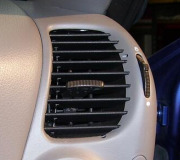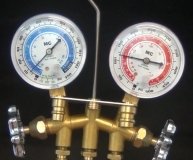From what I can gather its possible your heater core/coil is leaking antifreeze and needs to be replaced.
Low anti-freeze levels or poor circulation of anti-freeze throughout the cooling system will hamper heater performance as well. If there is not enough hot anti-freeze to circulate and deliver to the heater core, heater efficiency will be greatly reduced. If you suspect a problem with your heater, first check the anti-freeze level in the radiator and make sure the fluid is in good shape and of proper color (either green or orange/red if you're using one of the new extended life products on the market).
To check anti-freeze color, dip some out and look at it in a glass container. (We use an anti-freeze hydrometer, which is basically an expensive turkey baster.) When you are looking at the anti-freeze in the radiator, you can only see the top surface color, and it will usually look okay even if it's not.
If low or contaminated fluid is not the problem, feel the two heater hoses going from the engine to the heater to make sure they are hot (the engine needs to be at normal operating temperature). If the heater hoses are not hot, inspect the radiator hoses for internal cooling system blockage.
With the engine at normal operating temperature, the upper radiator hose should be very hot, and the lower radiator hose should be just slightly less hot. If there is a substantial temperature variation, a blockage or restriction is probably present. A faulty thermostat and a radiator or heater core that is full of calcium deposits or rust build up are a few causes of cooling system restrictions.
Thermostats generally do not need periodic replacement unless there is an under- or over-heating situation.
Please note I am no mechanic and can be wrong.
SPONSORED LINKS
Tuesday, February 6th, 2007 AT 3:19 AM




